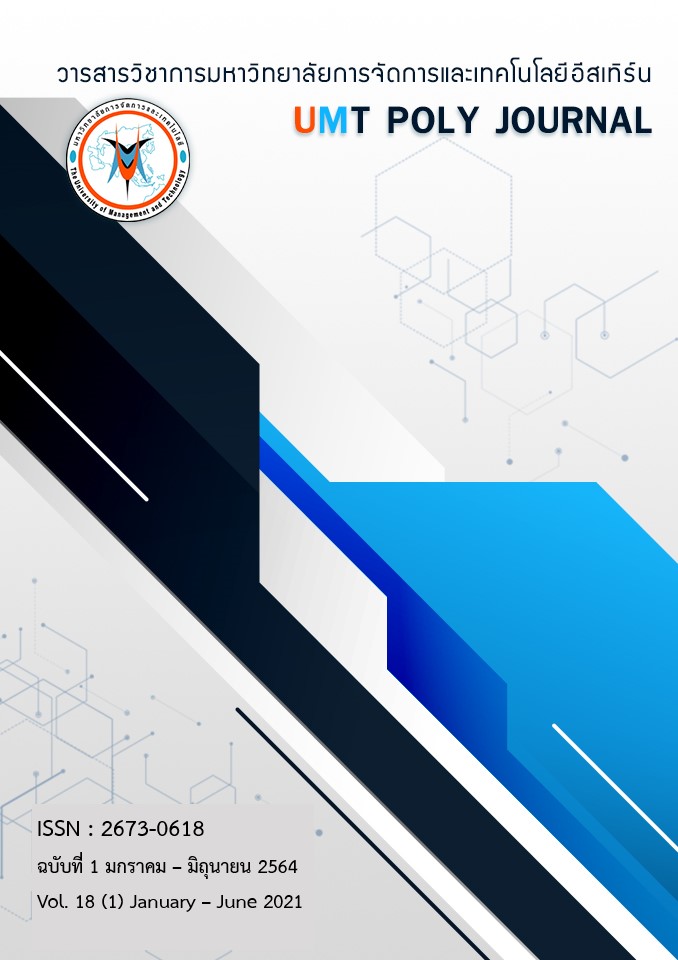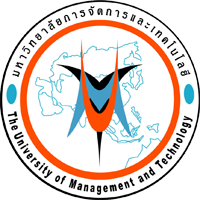The effect of the EchoEnglish application on EFL students’ speaking skills
คำสำคัญ:
EchoEnglish application, EFL students, Speaking skillsบทคัดย่อ
Thai government have created and promoted an application named the EchoEnglish application which aims to help Thai people to improve their English communication. The aim of this application is to increase level of confidence in speaking. Learners can achieve their learning goals and relieve their fear when they are speaking, keeping motivated. Therefore, this study aims to investigate the effect of the EchoEnglish application on EFL students’ speaking skills. This result was conducted to investigate the effects of EchoEnglish application on EFL students’ speaking skill (total scores), to investigate the effects of EchoEnglish application on EFL students’ sub speaking skills (Fluency, Pronunciation, Vocabulary), and to compare the effects of EchoEnglish application on the speaking skills of Math-Science students to those of English-Chinese students. Furthermore, this study was aimed to explore EFL students’ opinions about learning English speaking through the EchoEnglish application. This chapter presents the results of the study. The results of the research objectives regarding the effects of EchoEnglish application on EFL students’ speaking skills (total scores), the effects of EchoEnglish application on EFL students’ sub speaking skills (Fluency, Pronunciation, Vocabulary), the comparison of the effects of EchoEnglish application on the speaking skills of Math-Science students to those of English-Chinese students. It showed the differences between the students’ speaking before and after the experiment. Furthermore, students’ opinions about learning English speaking through the EchoEnglish application were presented.
Downloads
เอกสารอ้างอิง
Dornyei. (2001). Motivational strategies in the language classroom.
Gerard, K. (2000). How to teach pronunciation. Edinburgh, England: Peason Education.
Harvey, L. (2000). New realities: The relationship between higher education and employment. Tertiary Education & Management, 6(1), 3-17.
Han, T., & Keskin, F. (2016). Using a mobile application (WhatsApp) to reduce EFL speaking anxiety. Gist: Education and Learning Research Journal (12), 29-50.
Hwang, W. Y., Huang, Y. M., Shadiev, R., Wu, S. Y., & Chen, S. L. . (2014). Effects of using mobile devices on English listening diversity and speaking for EFL elementary students. Australasian journal of educational technology, 30(5), 503-516.
Kayi, H. (2006). Teaching Speaking: Activities to Promote Speaking in a Second Language. . The internet TESL journal. Retrived from http://iteslj.org/Techniques/Kayi- TeachingSpeaking.html.
Khamkhien, A. (2010). Teaching English Speaking and English Speaking Tests in the Thai Context: A Reflection from Thai Perspective. English Language Teaching, 3(1), 184-190.
Kelso, K. (2010). Educational technologies for English language learners: English as a second language. Center for Digital Education. Strategy Paper. Retrieved from www. centerdigitaled. com.
Krashen, S. D. (1981). Second language acquisition and second language learning: Pergamon Press Inc.
Kusmaryani, W., Musthafa, B., & Purnawarman, P. (2019). The influence of mobile applications on students’ speaking skill and critical thinking in
English language learning. Paper presented at the Journal of Physics: Conference Series.language teaching, 3-16.
Machmud, K., & Abdulah, R. (2014). Using mobile phone to overcom students' anxiety in speaking English. Paper presented at the SHS web of conferences.
Mahu, D.-P. (2012). Why Is Learning English So Beneficial Nowadays? International Journal of Communication Research, 2(4), 374.
Nunan, D. (1991). Language teaching methodology: A textbook for teachers. London, UK: Prentice hall.
Ni, H. (2012). The effects of affective factors in SLA and pedagogical implications. Theory & Practice in Language Studies, 2(7).
Rivers, W. M. (1987). Interaction as the key to teaching language for communication. Interactive
Taipetch. (2019) EchoEnglish application.
Viswat, L. J., & Jackson, S. A. (1993). Training students to learn on their own. TESL reporter, 26(1), 16-23.
ดาวน์โหลด
เผยแพร่แล้ว
ฉบับ
ประเภทบทความ
สัญญาอนุญาต
ประกาศลิขสิทธิ์
เนื้อหาและข้อมูลในบทความที่ลงตีพิมพ์ในวารสารวิชาการมหาวิทยาลัยการจัดการและเทคโนโลยีอีสเทิร์น ถือเป็นข้อคิดเห็นและความรับผิดชอบของผู้เขียนบทความโดยตรง ซึ่งกองบรรณาธิการวารสารไม่จำเป็นต้องเห็นด้วยหรือร่วมรับผิดชอบใด ๆ
บทความ ข้อมูล เนื้อหาหรือรูปภาพ ฯลฯ ที่ได้รับการตีพิมพ์ในวารสารวิชาการมหาวิทยาลัยการจัดการและเทคโนโลยีอีสเทิร์น ถือเป็นลิขสิทธิ์ของวารสารวิชาการมหาวิทยาลัยการจัดการและเทคโนโลยีอีสเทิร์น หากบุคคลหรือหน่วยงานใดต้องการนำข้อมูลทั้งหมดหรือบางส่วนไปเผยแพร่ต่อหรือเพื่อกระทำการใด ๆ จะต้องได้รับอนุญาตเป็นลายลักษณ์อักษรจากวารสารวิชาการมหาวิทยาลัยการจัดการและเทคโนโลยีอีสเทิร์นก่อนเท่านั้น




